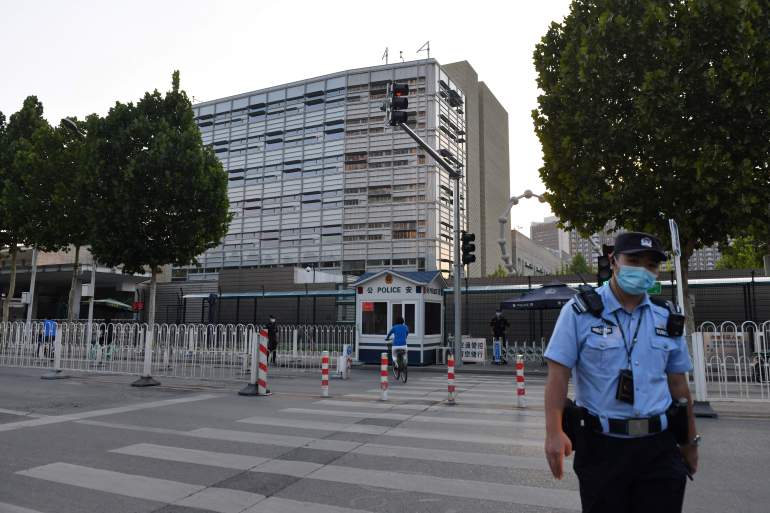‘Mayhem’: China warned by US, France on air safety during COVID
Emails obtained from the US Federal Aviation Administration reveal concerns over Beijing’s ‘zero COVID’ policy.

China’s strict COVID rules for flights during the pandemic were repeatedly flagged as an air safety risk by foreign officials, with one diplomat describing the situation as “mayhem and even dangerous”, newly released emails reveal.
The emails, obtained from the United States Federal Aviation Administration, show that China’s “zero COVID” policy, including strict quarantine and disinfection procedures, was a source of safety concerns for multiple countries, including the United States, France and the Netherlands.
Keep reading
list of 4 itemsMain hearings open into UK’s handling of COVID-19 pandemic
Did COVID change the way we think about relationships and money?
Vietnam officials go on trial over alleged COVID flight bribes
In August 2021, the French embassy in Beijing warned the Civil Aviation Administration of China (CAAC) that new “closed loop” procedures and compulsory quarantine for ground staff raised “serious flight safety concerns”, according to an email circulated among US officials.
“The situation is getting mayhem and even dangerous, as these new regulations plant serious flight safety concerns,” the French embassy told their US counterparts, according to an email sent by the US embassy in Beijing to officials at the Department of State and Department of Transportation.
“Over unilateral measures taken by China since March 2020 such as ‘circuit breaker’, these new measures could drive to additional cancellation of flights. This warning has been coordinated with the Netherlands – we hope other States will join our concerns.”
‘Jeopardising commercial aviation safety’
China’s introduction of new aircraft disinfectant rules in December raised further concerns among US officials, after a Delta Air Lines flight was forced to turn back to Seattle to avoid violating safety limits on working hours.
“We congratulate the People’s Republic of China for your excellent commercial aviation safety record,” the US embassy said in a letter to China’s customs agency on December 27.
“The policy has had the unfortunate consequence, however, of jeopardising commercial aviation safety and security because the additional time required to implement the policy forces the US and other international air crews to exceed acceptable safety allowances for time on duty.”


The embassy said the matter was urgent but had a “straightforward solution”.
“We respectfully request your urgent assistance in ensuring US and other international air crews can depart China expeditiously and not be in violation of safety norms and regulations,” the letter said.
US officials also criticised the logic of the Chinese government’s policy-making in discussions among themselves.
“It appears this policy came about because an Air China aircraft flew into Taiyuan from Europe with a passenger who tested positive,” Adh T Stevens, an economic affairs officer at the US embassy, said in an email to colleagues discussing the plane-cleaning rules.
“Air China then used that plane for a domestic Beijing-Shanghai flight where three people – all seated near where the other positive passenger sat – tested positive. Hence the extra disinfection. It boggles the mind how they think applying this policy to international carriers would do any good to fix the problem.”
In another email, Stevens said one of his contacts had described the policy in Chinese as “‘hurting others but without deriving any benefit'”.

Hong Kong airline Cathay Pacific’s decision to sack three pilots who breached isolation requirements while staying at a hotel in Frankfurt in November 2021 also came in for criticism from aviation officials.
“Quite a ‘punitive’ measure with no regard for safety,” Nicole Didyk Wells, a senior FAA official for Asia, said in an email chain about the sackings, which came as Hong Kong was adhering to ultra-strict quarantine rules.
“Not sure how good the pilots are, but with an overall global pilot shortage that’s pretty crazy.”
The FAA referred a request for comment to the US State Department, which did not respond to inquiries.
The CAAC did not respond to a request for comment. Efforts to contact China’s General Administration of Customs by fax were unsuccessful.
The French embassy in Beijing did not respond to a request for comment. The Netherlands embassy declined to comment in time for publication.
Al Jazeera obtained the emails from the FAA via a freedom of information request.
China’s strict “zero COVID” policy was credited with preventing mass death and disease for more than two years until the emergence of highly transmissible variants and mounting economic and social costs made the strategy untenable.
Beijing scrapped the policy in late 2022 following rare mass protests across the country.